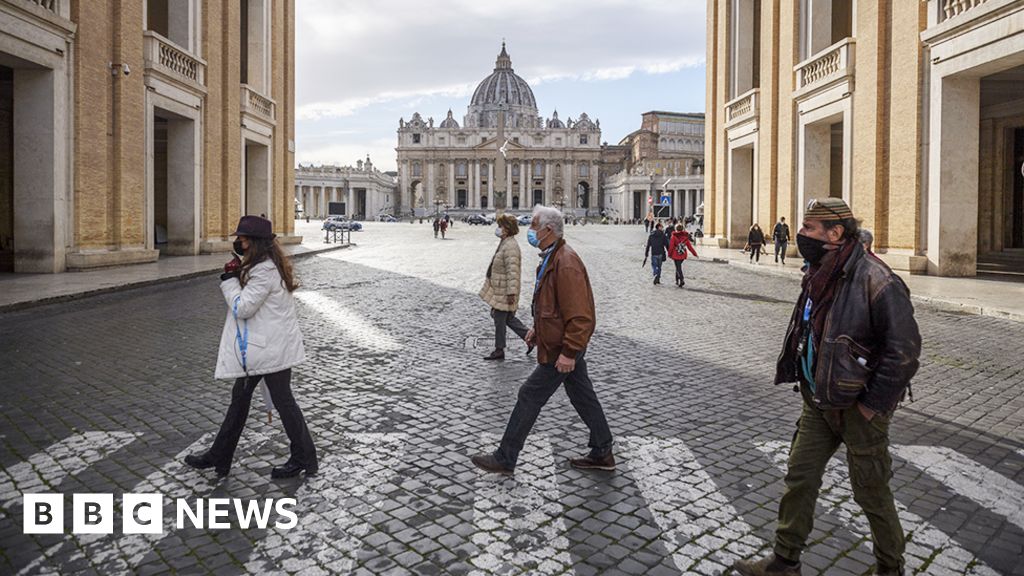
Covid: Is Europe lifting lockdown restrictions?
Europe's vaccination campaign has picked up pace and the number of infections is starting to fall.
Countries are now looking for ways to lift coronavirus restrictions safely, ahead of summer and the tourist season.
France is staring to ease itself out of the lockdown.
From 3 May, traveling further than 10km from home will be permitted again.
Shops, café terraces and cultural venues are expected to start opening their doors again from mid-May.
Secondary school students are expected to go back in early May and nurseries and primary schools have already reopened.
The curfew will be lifted on 2 June.
A controversial new lockdown law enables Germany's federal government to impose an overnight curfew and shut schools wherever infection rates rise too high.
Cities or areas that exceed a rate of 100 new infections per 100,000 inhabitants for three consecutive days have to impose the measures.
Large parts of Germany already exceed the limit, including cities such as Berlin, Cologne, Frankfurt and Munich as well as many rural areas.
The law will remain in place until 30 June.
Most of Italy is now in a "yellow zone" which means that bars and restaurants can reopen.
Most students are back at school, and some outdoor cultural events are allowed.
A curfew between 22:00 and 05:00 remains in place nationwide and masks are compulsory in all public spaces, indoors and outdoors.
Denmark has lifted a number of restrictions already - shops are open, outdoor eating is allowed and indoor dining will resume in early May.
The government has also introduced a "corona pass" for everyone over the age of 15.
This pass, available on mobile phone or on paper, shows whether people have been vaccinated, previously infected or have had a negative test in the past 72 hours.
People need to show it for entry to bars, restaurants, museums or hairdressers, or to attend football matches.
From 15 May, the government will allow any tourist to visit the country, if they have been vaccinated or can provide a negative coronavirus test.
However, restrictions are still in place for the Orthodox Easter on 2 May - travelling to another prefecture is not allowed and a curfew is in place.
From 3 May restaurants will be allowed to seat people outside.
Schools will reopen on 10 May.
From 4 May shopping centres and hotels will be allowed to reopen with reduced customer numbers.
All primary school children will be able to return to school.
Hairdressers will also be able to reopen.
The government has approved the return of the upper level of primary school from 3 May, on a week-on, week-off basis, but only in regions with favourable numbers.
All shops are due to open from 10 May and outside table service in pubs and restaurants will resume from 17 May.
The government says Spain will welcome tourists from June, following a pilot trial of digital health certificates at its airports in May.
Tourism Minister Fernando Valdes said that Spain "will be ready" to use a Covid passport by June.
Some regions of Spain have started lifting restrictions. Catalonia now allows movement between zones, and in Valencia, restrictions on numbers of people allowed into bars and restaurants are being further eased.
Some lockdown measures have already been eased. Schools have reopened and a ban on non-essential travel was lifted in April.
Hairdressers and other businesses are also open.
Outdoor dining at bars and restaurants will be allowed from 8 May.
Lockdown in Portugal has been gradually eased, with pupils now back in schools.
Museums, hair salons and restaurant and cafe terraces have reopened.
Number-restrictions on sports activities have been removed and higher capacity limits for weddings and baptisms and big outdoor events introduced.
A controversial three-month curfew, which sparked protests and legal challenges, ended on 28 April.
Other lockdown measures are also being lifted.
Outdoor areas in cafes have reopened - limits remain for the number of customers, and reservations are required.
Non-essential stores can welcome "spontaneous shoppers" without an appointment.
The Eurovision song contest, scheduled for Rotterdam between 18 and 22 May will go ahead with a live audience.
The Dutch government confirmed 3,500 people will be allowed to watch six dress rehearsals and three live performances inside the city's Ahoy Arena.
The Irish government has announced a gradual lifting of lockdown restrictions in May and June, subject to the public health situation at the time.
From 10 May, hairdressers, museums, libraries and galleries can reopen.
All shops will be opened on 17 May, and hotels and B&Bs from 2 June.
From 7 June, restaurants and bars can open outside for groups of up to six customers, and outdoor sports matches can be played again - but with no spectators.
Sweden tried to avoid imposing rules when other countries were in lockdown, but new emergency laws now give the government the power to impose coronavirus-related curbs.
Visitor limits are in force in shops and public venues and in cafes and restaurants.
Health authorities in Uppsala, one of the most densely populated regions of Sweden, have been urged to enter a "personal lockdown".
Residents are also asked to wear a face mask on public transport and indoor public spaces such as shops.
Sincery Best Jokes
SRC: https://www.bbc.co.uk/news/explainers-53640249
powered by Blogger News Poster

0 Comments:
Yorum Gönder